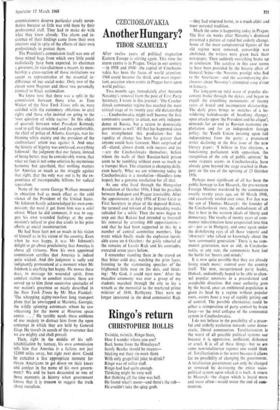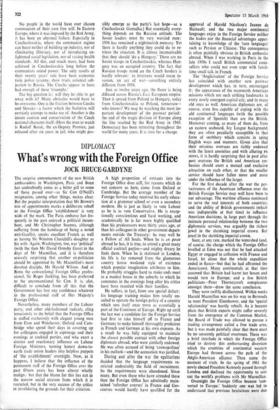Another Hungary?
CZECIIOSLOVAKIA TIBOR SZAMUELY
After twelve years of political stagnation Eastern Europe is stirring again. This time the storm centre is in Prague. Twice in our century —in 1938 and 1948—the capital of Czechoslo- vakia has been the focus of world attention; 1968 could become the third, and most impor- tant, occasion when events in Prague burst upon world politics.
Two months ago, immediately after Antonin Novotny's removal from the post of First Party Secretary, I wrote in this journal: 'The Czecho- slovak communist regime has reached the most critical stage of its twenty year old dictatorship ... Czechoslovakia might well become the first communist country to attain, not only indepen- dence of Russia, but a return to democratic government as well.' All that has happened since has strengthened this prediction—but the rapidity of change has been far greater than anyone could have foreseen. Most surprised of all—elated, almost drunk with success and joy —are the Czechoslovaks themselves, before whom the walls of their Russian-built prison seem to be tumbling without even so much as a trumpet blast. The situation is changing daily, even hourly. What we are witnessing today in Czechoslovakia is a revolution—bloodless (one hopes), but a genuine revolution for all that.
As one who lived through the Hungarian Revolution of October 1956, I find the parallels between Budapest and Prague irresistible. After the appointment in July 1956 of Erne Gero as First Secretary in place of the deposed Rakosi, the turmoil and tension of the preceding weeks subsided for a while. Then the news began to seep out that Rakosi had intended to forestall his removal by arresting 400 oppositionists- and that he had been supported in this by a number of central committee members. The event which finally made the explosion inevit- able came on 6 October: the grisly reburial of the remains of Laszlo Rajk and his comrades, executed seven years before.
I remember standing there in the crowd on that bitter cold day, watching the grim faces, listening to the stammering speeches of the frightened little men on the dais, and think- ing: 'My God, it could start now.' After the macabre ceremony was over a group of my students marched through the city to lay a wreath at the memorial to the martyred prime minister of 1848, Batthyany. They were no longer interested in the dead communist Rajk —they had returned home, to a much older and truer national tradition.
Much the same is happening today in Prague. The first six weeks after Novotny's dismissal presented a picture of rapid but orderly change. Some of the most compromised figures of the old regime were removed, censorship was abolished, the writers were given back their newspaper. Then suddenly everything broke up in confusion. The catalyst in this case seems to have been provided by the bizarre affair of General Sejna—the Novotny protdge who fled to the Americans—and the accompanying dis- closures about Novotny's attempted coup d'etat in January.
The long-pent-up tidal wave of popular dis- content broke through the dykes, and began to engulf the crumbling monuments of twenty years of brutal and incompetent dictatorship. The daily press brings us snatches of a be- wildering kaleidoscope of headlong change: open attacks upon 'the President and his clique'; demands for an end to Russian economic ex- ploitation and for an independent foreign policy; the Youth Union insisting upon full independence from the party; a prominent writer declaring in the first issue of the new literary paper: 'I believe in free elections, a functioning parliament with opposition, the recognition of the role of public opinion.' In some respects events in Czechoslovakia have already gone beyond the stage reached in Hun- gary on the eve of the uprising of 23 October 1956.
Perhaps most significant of all has been the public homage to Jan Masaryk, the pro-western Foreign Minister murdered by the communists exactly twenty years ago, on 10 March 1948, and ceaselessly reviled ever since. For Jan was the son of Thomas Masaryk : the founder of the Czechoslovak state, the embodiment of all that is best in the western ideals of liberty and democracy. The results of twenty years of com- munist indoctrination have evaporated into thin air—just as in Hungary, and once again under the disbelieving eyes of all those 'experts' and 'observers' who talked so knowingly about the 'new communist generation.' There is no com- munist generation, new or old; in Czechoslo- vakia, at any rate, the communists have lost the battle for 'hearts and minds.'
It is now quite possible that they are already losing much more: control over the country itself. The new, inexperienced party leader, Dubcek, undoubtedly hoped to be able to chan- nel popular emotions in a preordained and acceptable direction. But once authority goes by the board, once an embittered population is given its head by a regime without popular roots, events have a way of rapidly getting out of control. The possible alternatives could be either a reimposition of party control by brute force—or the total collapse of the communist system in Czechoslovakia.
I do not believe in the possibility of a peace- ful and orderly evolution towards some demo- cratic, liberal communism. Totalitarianism is the worst of all possible political systems not because it is oppressive, inefficient, dishonest or cruel. It is all of these things—but so are some non-totalitarian regimes one could think of. Totalitarianism is the worst because it allows for no possibility of changing the government. A totalitarian government can only be changed or removed by destroying the entire socio- political system upon which it is built. A return to Masaryk—the slogan which is heard more and more often—would mean the end of com- munism.
No people in the world have ever chosen communism of their own free will. In Eastern Europe, where it was imposed by the Red Army, it has been an abysmal failure. Especially in Czechoslovakia, where the communist regime can boast neither of building up industry, nor of eliminating illiteracy, nor of introducing en- lightened social legislation, nor of raising health standards. All this, and much more, had been achieved in Czechoslovakia long before the communists seized power. The only results of their twenty years' rule have been economic ruin, police tyranny, show trials, colonial sub- jection to Russia. The Czechs appear to have bad enough of these `triumphs.'
The big question is : will they be able to get away with it? Many obstacles would have to be overcome. One is the friction between Czechs and Slovaks—a factor which the Stalinists will certainly attempt to make use of. Another is the innate caution and conservatism of the Czech national character itself. (Here the man to watch is Rudolf Barak, the ex-Deputy Premier, just released after six years in jail, who might pos-
sibly emerge as the party's last hope—as a Czechoslovak Gomulka.) But essentially every- thing depends on the Russian attitude. The Soviet leaders must be very worried men: 1956 has remained a nightmarish memory. Yet there is hardly anything they could do to re- trieve the situation. It is almost inconceivable that they should 'do a Hungary.' There are no Soviet troops in Czechoslovakia, whereas Hun- gary was an occupied country. The fact that Russian troops stand on the Czech borders is hardly relevant : to intervene would mean in- vasion, an act of war—something entirely different from 1956.
Just as twelve years ago, the flame is being diffused across Russia's East European empire. Then it spread from Poland to Hungary, today from Czechoslovakia to Poland, tomorrow— who knows? We may be watching the most im- portant development of the postwar period: the end of the tragic division of Europe along the line reached by the Red Army in 1945. Democracy has been retreating throughout the world for many years. It is time for a change.











































 Previous page
Previous page